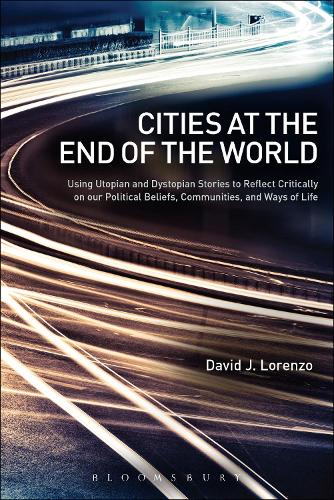
Cities at the End of the World: Using Utopian and Dystopian Stories to Reflect Critically on our Political Beliefs, Communities, and Ways of Life
(Paperback)
Available Formats
Publishing Details
Cities at the End of the World: Using Utopian and Dystopian Stories to Reflect Critically on our Political Beliefs, Communities, and Ways of Life
By (Author) David J. Lorenzo
Bloomsbury Publishing PLC
Bloomsbury Academic USA
10th March 2016
United States
Classifications
Tertiary Education
Non Fiction
Social and political philosophy
320.01
Physical Properties
Paperback
240
Width 152mm, Height 229mm
327g
Description
This book undertakes a critical examination of contemporary political problems through discussions of three utopian and three dystopian texts. Selected stories from Morris, Orwell, More, Bellamy, Neville, and Zamyatin are used to generate questions about fundamental economic, political, and social problems, human nature, and conceptions of the good life. This unique work is an exceptional resource for all students of political philosophy and utopian literature, as well as for general readers interested in political affairs.
Reviews
In Cities at the End of the World David Lorenzo tackles key themes of utopian and dystopian writing, such as the relationship of the individual and society, the inherent tensions in the human pursuit of knowledge and happiness, and the role of the state in balancing personal desires against equality, justice and order. His focus on what we might be able to learn from his findings meanwhile follows the spirit of the authors he studies: by exploring alternative societies he calls on us to address contemporary problems. Combining acute analysis with accessibility Lorenzos work has much to offer, not just to scholars and general readers, but to political decision makers as well. * Gaby Mahlberg, Senior Lecturer, Early Modern British History, Northumbria University, UK *
A timely book for our troubling political times in the West and particularly the US. In the face of serious economic challenges, globalization and the failure of both public and private sectors in providing social and economic goods in anything like a just distribution, Western nations need to 'rethink themselves.' David Lorenzos exploration of utopias and dystopias is an imaginative and powerful means for engaging that rethinking. Such stories challenge our complacency about both our contemporary politics and our ends. * Robert C. Bishop, Associate Professor of Physics and Philosophy, Wheaton College, USA *
In a paradigm expanding, comparative framework, Lorenzo proves that analyzing utopian and dystopian stories is politically relevant. His thorough and meticulous book examines their role and function in illuminating political, social, and economic debate. Comparing diverse theories he examines the essential issues that all good political theory addresses: human nature; the structure of a good or bad society, political order, or economy; content, nature, and meaning of freedom; extent of equality; the good life; who rules and why; and power. * Conrad P Waligorski, Professor Emeritus, University of Arkansas, USA and author of John Kenneth Galbraith: The Economist as Political Theorist *
A great contribution regarding the potential of the engagement between politics and literature -- Victor Coutinho Lage, International Relations Institute of PUC-Rio, Brazil * E-International Relations *
Author Bio
David J. Lorenzo received his Ph.D. from Yale University and is an Associate Professor, College of International Affairs, National Chengchi University, Taipei, Taiwan (ROC).
